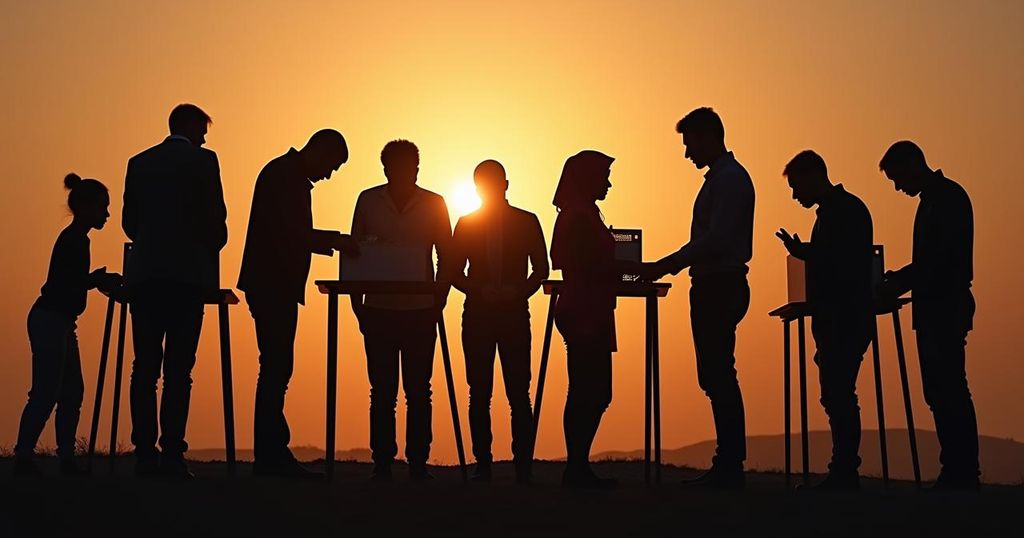Tunisia is holding elections expected to grant a second term to President Kais Saied, amid significant opposition suppression and criticisms of electoral fairness. With the incarceration of key challengers, Saied’s consolidation of power raises major concerns about the state of democracy in the country. Economic difficulties persist, coupled with rising discontent among the populace, making this election a pivotal moment for Tunisia’s future.
On Sunday, Tunisians participated in an election expected to extend President Kais Saied’s term as his main challengers have been incarcerated. At 66 years old, President Saied is poised to secure a second term, having previously capitalized on anti-establishment sentiments five years ago and subsequently concentrating power within the presidency after suspending parliament and drafting a new constitution. This election marks the third since the 2011 uprising ousted President Zine El Abidine Ben Ali, who was the first autocrat to fall amid the Arab Spring, a movement that also led to upheavals in Egypt, Libya, and Yemen. While previous elections were lauded by international observers for their adherence to democratic standards, questions have arisen regarding the integrity of this year’s electoral process, following widespread arrests and actions by an election authority appointed by Saied. Opposition parties have called for a boycott of the elections, raising concerns about their legitimacy. Tunisia, once celebrated as the Arab Spring’s only triumph, has seen its political landscape deteriorate over the past few years. Following a period marked by democratic advancements, including a new constitution and Nobel Peace Prize-winning civil society interventions, the country has struggled with economic hardships, political strife, and public dissatisfaction. President Saied, an outsider in the political arena, won the presidency in 2019 by promoting a vision for a transformed Tunisia focused on empowering youth and local governance. The current election serves as a critical indicator of public sentiment regarding the direction of Tunisia’s democracy since Saied assumed power. His supporters appear steadfast, although his detachment from any political party adds ambiguity to the depth of his backing. This being the first presidential election since Saied enacted sweeping political changes in July 2021—declaring a state of emergency, dismissing the prime minister, and consolidating his power through a new constitution—has heightened concerns among pro-democracy factions who consider these moves a governmental coup. Despite this sentiment, Saied’s revised constitution was ratified in a referendum marked by low voter turnout. The list of candidates is limited, with only three approved to run: Saied, veteran politician Zouhair Maghzaoui, and Ayachi Zammel, a businessman facing voter fraud charges. Notably absent from the race are significant opposition figures, including Rached Ghannouchi, the co-founder of the leading Ennahda party, who has been imprisoned for his criticism of the president. In addition to political challenges, the country’s economy remains in dire straits, with unemployment rates soaring to 16%, disproportionately affecting young people. The slow post-pandemic recovery and Tunisia’s entrenched dependency on international financial institutions have compounded the crisis. Negotiations over a crucial $1.9 billion bailout from the International Monetary Fund have stalled due to Saied’s refusal to comply with proposed conditions, which would likely be unpopular among an already beleaguered populace. Saied’s administration has also adopted a stringent stance towards migration, with increasing instances of both Tunisian and sub-Saharan migrants attempting to reach Europe. The government accused migrants of contributing to crime and violence, leading to violent attacks on migrant communities. Internationally, Tunisia has strengthened its ties with traditional allies while also pursuing partnerships with countries like Iran and China. President Saied has positioned Tunisia against perceived foreign intervention, stating his intention not to allow Tunisia to serve as a “border guard” for Europe while maintaining critical relationships with European nations regarding migration management.
The political situation in Tunisia is significantly influenced by its history since the Arab Spring, which saw the country emerge as a beacon of democracy in the region. However, years of political contention, economic hardship, and the recent consolidation of power by President Kais Saied have all contributed to a complex and often troubling landscape. Before Saied’s leadership, Tunisia had made noteworthy strides toward stability and prosperity, with a focus on civil society and democratic engagement. However, the aftermath of the 2011 uprising has increasingly revealed underlying economic fragility and political division, culminating in ongoing struggles for rights and democratic representation. Saied’s presidency marks a critical juncture in this ongoing narrative, as the elections present an opportunity to gauge public opinion on his governance and the state of democracy in Tunisia.
In conclusion, the upcoming election in Tunisia is surrounded by significant uncertainty regarding its fairness and the integrity of the electoral process, particularly due to the incarceration of prominent opposition figures and a controversial political climate under President Kais Saied. With economic difficulties persisting and public discontent rising, the election will provide insights into the future trajectory of Tunisian democracy and governance. Saied’s ability to navigate these challenges and retain popular support will be crucial as the nation grapples with its identity and direction in the post-Arab Spring era.
Original Source: www.cnn.com





